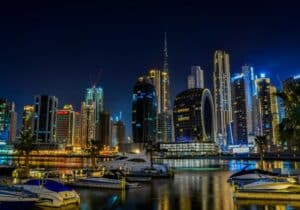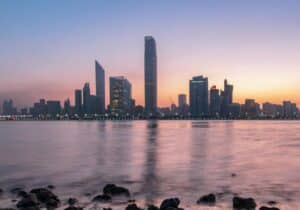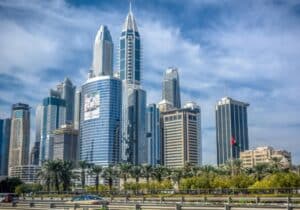Are you looking to invest in the UAE real estate market? You’ve come to the right place. As a growing global investment hub, the UAE has quickly become one of the top areas for real estate investments. Whether you’re looking for world class amenities and luxury or something laid back with a resort feel, the UAE property market offers something for everyone.
In this ultimate guide to real estate investment UAE, you will learn about:
Who can buy property in the UAE?
UAE residents
UAE nationals are allowed to buy real estate anywhere in the UAE. They can own anywhere and obtain full ownership of the real estate investment in UAE. The same goes for certain countries in the Middle East, including:
- Qatar
- Saudi Arabia
- Kuwait
- Oman
- Bahrain
Non-UAE residents

Like citizens, foreign nationals can have full ownership rights. The Golden Visa UAE is the ideal option for foreign nationals looking to invest in UAE real estate. The Golden Visa offers long term residency for foreign property investors in the UAE.
Another option for foreign nationals who don’t want a long-term investment is the leasehold property. These are properties with a long-term lease, generally lasting 99 years.
What are the benefits of real estate investment in the UAE?
There are various benefits of UAE real estate investment, let’s take a closer look
 1. No property taxes
1. No property taxes
Based on taxes in UAE, there are no annual property taxes in the UAE, making it one of the top benefits of investing in the UAE property market. Additionally, if owners want to rent out their property there are no taxes on income.
The only property taxes in the UAE are from selling your property which come in at around two to four percent and is usually split between the seller and buyer.
 2. Thriving real estate market
2. Thriving real estate market
The UAE property market is booming and has been for the past five years.
Residential property values have slowly increased, providing fantastic insights into what potential investors can expect over the next five years.
Statistics show that between 2024-2029, the real estate market in the UAE is expected to grow by 2.25 percent annually. The surge in demand for luxury properties isn’t going anywhere with more high net worth investors wanting in on the UAE investment opportunities.
 3. Residency by investment opportunities
3. Residency by investment opportunities
The UAE Golden Visa offers those looking to invest in UAE real estate the chance to obtain residency by investment. While gaining citizenship in the UAE is near impossible for investors, the Golden Visa offers a legitimate pathway to obtain long term residency to live, work, and study in the UAE. Still, if you want to know how to get UAE citizenship, there are some options, including citizenship by marriage, descent, exceptional merit, and naturalization.
 4. High rental yields
4. High rental yields
Certain areas in the United Arab Emirates, most notably Abu Dhabi and Dubai offer some of the highest rental yields in the world. For example, rental yields in Dubai are between six to ten percent annually, that is massive compared to some of the most popular property rental cities in the world.
If you’re wondering, how does real estate investment in UAE compare to other countries? Here are a few comparisons of rental yields across the globe:
City | Rental yield |
Riyadh | 11% |
Dubai | 8.1% |
Abu Dhabi | 6.4% |
New York | 5.3% |
Barcelon | 4.7% |
London | 3.6% |
Sydney | 3.1% |
Singapore | 3% |
Tokyo | 2.8% |
Property Costs in the UAE
The cost of property in the UAE can vary significantly by area and property type. However, looking at the cost of buying property in UAE is one of the most significant factors to consider before investing in the UAE. Let’s take a look at some of the most popular cities in the UAE for property investment and what you can expect to pay.
City | Property type | Cost in US Dollars |
Dubai | Price per Square Meter to Buy Apartment in City Centre | $6,044 |
Dubai | Price per Square Meter to Buy Apartment Outside of Centre | $3,387 |
Abu Dhabi | Price per Square Meter to Buy Apartment in City Centre | $4,970 |
Abu Dhabi | Price per Square Meter to Buy Apartment Outside of Centre | $4,284 |
Ras al Khaimah | Price per Square Meter to Buy Apartment in City Centre | $5,184 |
Ras al Khaimah | Price per Square Meter to Buy Apartment Outside of Centre | $2,177 |
Sharjah | Price per Square Meter to Buy Apartment in City Centre | $6,073 |
Sharjah | Price per Square Meter to Buy Apartment Outside of Centre | $4,190 |
Ajman | Price per Square Meter to Buy Apartment in City Centre | $4,053 |
Ajman | Price per Square Meter to Buy Apartment Outside of Centre | $2,507 |
Types of Property in the UAE
Residential properties

- Apartments: Apartments are extremely popular in the UAE. As space is limited within the major cities, apartments are the most viable option for most. There are various apartment types from studios to multi-bedroom units.
- Townhouses: If you’re looking to move into expat communities, townhouses are generally the most popular option. This is a great option if you are moving to the UAE for the first time and want to be around those that know how the ins and outs of life in the UAE works.
- Villas: Villas in the UAE are some of the most popular property investment options in the UAE. Villas are generally quite a bit bigger than other residential properties, making them ideal for family living.
Commercial properties
For those looking to set up a business in the UAE, residential properties are available in all major business areas within the UAE. This is a fantastic option for those looking into the UAE residency through company formation program. From warehouses and factories to retail units and office spaces, the UAE has a large range of commercial properties available.
Off-plan properties
Investing in off-plan properties in the UAE may offer lower prices. These properties are not built yet, meaning you’ll have to wait to make a profit, however, the potential for capital appreciation increases significantly. This is particularly true for popular living areas in the UAE.
New Properties vs Resale Properties in the UAE

New properties come with some benefits, including that they are generally more modern, don’t require as much renovation, and are often built to modern building regulations.
Resale properties are often less expensive but may need extensive restorations depending on how old the property is. It’s important to remember that up and coming areas in the UAE have strict standards and most expats are looking for modern furnishings and comfortable living standards. However, the main benefit of purchasing resale properties is that you can see exactly what the property looks like, whereas off-plan properties may change along the way.
Where to Buy Property in the UAE
Dubai
Dubai is by far the most popular option for real estate investment in the UAE. It offers high rental yields, and strong demand from investors and expats due to its range of accommodation options.
Whether you’re looking for the ultimate retirement investment at Dubai Marina, a family friendly space in Jumeirah Village Circle, or somewhere close to work in an area like Business Bay, Dubai has it all and more, with a splash of luxury and innovation.
Abu Dhabi
As the capital of the UAE, Abu Dhabi offers a stable and well-regulated real estate market, making it an attractive option for long-term investors. The city is known for its high-end residential developments, cultural landmarks, and government-backed infrastructure projects.
Whether you prefer the luxury waterfront lifestyle of Al Raha Beach, the cultural appeal of Saadiyat Island, or the vibrant urban feel of Al Reem Island, Abu Dhabi provides a mix of exclusivity, comfort, and strong investment potential.
Sharjah
Sharjah is a growing hotspot for real estate investment, particularly for those seeking affordable property options in a family-friendly environment. With a more relaxed pace of life compared to Dubai, it offers a range of properties at lower prices while maintaining strong rental demand.
Areas like Aljada and Tilal City provide modern developments with excellent amenities, while Al Khan and Muwaileh attract those looking for convenient city living with easy access to Dubai.
Ras Al Khaimah
Ras Al Khaimah (RAK) is an emerging investment destination, known for its scenic coastline, growing tourism industry, and investor-friendly regulations. With a focus on beachfront living and resort-style communities, RAK is ideal for those seeking a quieter alternative to Dubai.
Al Hamra Village and Mina Al Arab offer picturesque waterfront properties, while Marjan Island presents excellent opportunities for luxury and holiday home investments.
Process of Buying Property in the UAE for Expats

As one of the most strategically placed destinations for multi-national companies, the UAE is a top contender for the best investment hub in the world. But before you take the leap, it’s good to know the property buying process in the UAE for expats. Let’s take a look:
- Choose a property: The first step is deciding on the type of property you want to invest in. Consider things like whether the property is in a freehold area to ensure you can legally purchase property. Then it’s onto the type of property, be it an apartment, townhouse, or villa.
- Find a real estate agent: Once you know the type of property you’re looking for and in which area, finding a real estate agent in the UAE isn’t difficult. If you know of other expats in the UAE, find out who they used in the past or look at online reviews to find the right fit for your needs.
- Apply for a mortgage (Optional): If you are not paying for the property upfront in cash then you will need to apply for a mortgage. This can be done through a local UAE bank or an international bank.
- Offers and agreements: Once you have the property in mind and the funds available it’s time to make an offer. If the amount is agreed upon, both parties agree to a Memorandum of Understanding (MoU). The buyer can then pay the initial fees.
- Finalization of sale: The buyer and seller then agree to a date of transfer. At this point the buyer transfers the money and ensures that the property is transferred into their name.
Once the property sale is completed, the buyer may want to apply for the UAE Golden Visa. This allows the property buyer to obtain long-term residency.
However, it’s important to note that there are strict criteria and regulations, so it is vital that the buyer knows what the qualifying requirements are before applying for the purchase of property.
UAE and Dubai Property Tax

Additionally, foreign investors don’t need to pay inheritance tax or income tax on property. However, their home country may implement tax regulations, so it’s important to speak with a global tax expert to know what you are liable for.
If foreign nationals purchase property in the UAE there is a four percent transfer fee. This is usually split between the buyer and seller. For buying property in Dubai, this is known as the Dubai Land Department (DLD) fee.
How Can Global Citizen Solutions Help You?
Global Citizen Solutions is a boutique migration consultancy firm with years of experience delivering bespoke residence and citizenship by investment solutions for international families. With offices worldwide and an experienced, hands-on team, we have helped hundreds of clients worldwide acquire citizenship, residence visas, or homes while diversifying their portfolios with robust investments.
We guide you from start to finish, taking you beyond your citizenship or residency by investment application.

Frequently Asked Questions About Real Estate Investment UAE
Is UAE good for real estate investment?
Absolutely! The UAE property market is thriving, offering foreign investors a golden opportunity to invest in one of the fastest growing markets in the world. Investment in Dubai real estate market is quickly becoming the most popular, with property prices offering a fantastic return on investment.
What are the benefits of investing in real estate in UAE?
The benefits of real estate investment in the UAE include no property tax, residency opportunities, economic stability, and high rental income. Long-term rentals typically provide an annual return of 5 to 8%, while short-term rentals can generate up to 13% in annual income. Additionally, areas like Dubai are home to a large expat population, attracting tourists from around the globe.
How can foreigners invest in real estate in the UAE?
Foreign nationals can purchase residential and commercial properties in the UAE. In fact, purchasing investment properties in the UAE is one of the best ways to get a long-term residency visa in the UAE for you and your family.
What is the minimum investment required for UAE real estate?
This depends on your ultimate goal. For example, property prices for those looking to obtain the UAE Golden Visa are generally over two million AED.
How profitable is real estate investment in Dubai?
Dubai’s property market is booming, with areas like Dubai Marina, Dubai Hills Estate, and downtown Dubai remaining popular. Apartments in Dubai generally have a rental yield of between six to eight percent, while Dubai properties like villas and townhouses come in at five to seven percent, some of the highest in the world.
What are the risks of investing in UAE real estate?
There are a few risks of buying property in Dubai and the UAE. There are strict regulations for foreign real estate investors, so having all the information about investment properties upfront is essential. For example, the property must be licensed by the Real Estate Regulatory Agency before proceeding with your application.
Which areas in the UAE offer the highest ROI for real estate investment?
Some of the highest ROI for real estate investment in the UAE can be found in Dubai Marina, Jumeirah Lake Towers (JLT), Business Bay, Downtown Dubai, Dubai Silicon Oasis (DSO), Jumeirah Village Circle (JVC), International City, Palm Jumeirah, Dubai Sports City, Al Reem Island (Abu Dhabi), Sharjah, and Ajman.
Can UAE real estate investors get residency or citizenship?
Real estate investors in the UAE can apply for residency by investment, also known as the UAE Golden Visa. There is no direct route to UAE citizenship by investment, however it is possible through options like marriage, descent, naturalization, and exceptional merit, but these citizenship pathways are generally quite difficult to obtain.
Can I make a profit on investment properties in the UAE?
Yes, UAE real estate investment is highly profitable, with property prices consistently rising. In 2022, real estate prices were 1.5 times higher than they were a decade ago. Property owners can also rent out their properties without having to pay taxes on rental income, making real estate in the UAE a valuable additional source of income.
Can foreigners buy property in Dubai?
Yes, due to legal changes in 2002, foreigners can freely buy, sell, and rent property in Dubai without needing special permissions or adhering to additional regulations. There are specific areas designated for foreign ownership in Dubai. These areas are approved by the Ruler of Dubai and include locations like Dubai Marina, Arabian Ranches, Palm Jumeirah, Jumeirah Beach Residence, and Downtown Dubai.
Can foreigners buy property in Dubai with mortgage?
Both expatriate residents and non-resident investors are eligible to obtain a mortgage to finance property purchases in Dubai.
What are the best areas for real estate investment in UAE?
The best areas for real estate investment in the UAE include Downtown Dubai, Palm Jumeirah, and Dubai Marina for high-end properties. Jumeirah Village Circle (JVC) and Dubai Sports City are ideal for more affordable investments with strong rental yields.
Are there restrictions on foreigners buying property in Dubai?
No, there are no restrictions on foreigners buying property in Dubai, except that the freehold property must be in a designated area. Foreigners can purchase freehold properties in designated areas without needing special permissions.
What is freehold property in Dubai for foreigners?
In Dubai, a freehold property means foreigners can fully own their property and the land it’s on, with no time limits or extra restrictions. This lets you buy, sell, or rent out your property freely. Popular freehold areas include Downtown Dubai, Palm Jumeirah, and Dubai Marina.
What are the taxes for real estate investment in UAE?
The UAE offers tax benefits for foreign real estate investors. There is no capital gains tax, no property tax, and no income tax on rental properties. However, there is a four percent property transfer fee when buying property in the UAE.
What is the ROI on real estate investments in Dubai?
The return on investment (ROI) on real estate investments in Dubai ranges between 5%-12% depending on the property location and market.
Is it better to invest in residential or commercial properties in the UAE?
It depends on the overall goal. Generally, commercial property can offer a higher rental yields, higher income streams, and longer leases from multiple tenants. However, they generally have a higher entry cost.


